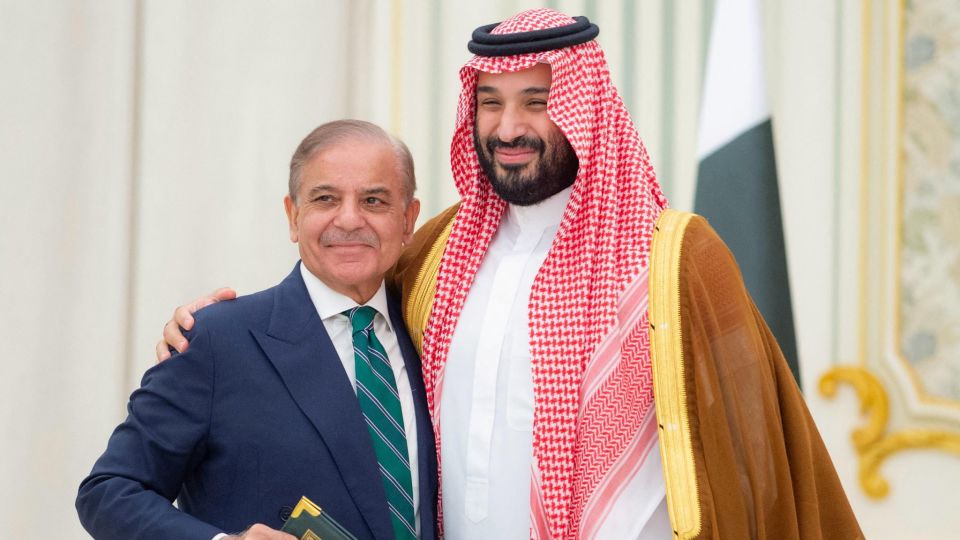After Pakistan’s first nuclear test in 1998 landed it under international sanctions and diplomatic isolation, the country turned for help to a longtime ally: Saudi Arabia.
Khalid Mahmood, then Pakistan’s ambassador to Riyadh, requested an urgent meeting with King Fahd bin Abdulaziz. The Saudi monarch objected to the test, but nevertheless pledged to “support you more than you expect,” according to Mahmood. The very next day, Pakistan was promised $3.4 billion in Saudi financial support, funds that helped Islamabad proceed with a second nuclear test, the ambassador said.
That moment helped shape Pakistan’s role, in the eyes of many, as a de facto nuclear shield for the kingdom.
So when Saudi Arabia and Pakistan signed a mutual defense agreement on Wednesday, it reignited speculation over whether Riyadh might now formally fall under Islamabad’s nuclear umbrella. “This is a comprehensive defensive agreement that encompasses all military means,” a Saudi official told Reuters.
The deal includes defense industry collaboration, technology transfer and military co-production, according to Jamal Al Harbi, the media attaché at the Saudi embassy in Islamabad. Writing in Arab News Pakistan, a Saudi state-linked outlet, he added that “capacity-building and training” were also part of the agreement.
While the senior Saudi official said the deal was “years” in the making, its timing – just a week after an unprecedented Israeli attack on neighboring Qatar, a staunch US ally – suggests that Riyadh is looking beyond Washington to bolster its defenses after decades of near-total reliance on American protection.
During Donald Trump’s first term, Gulf Arab states had hoped that he would be the US president who truly appreciated their security concerns and acted decisively to protect them. His first term initially seemed promising: he withdrew from the Iran nuclear deal, and his administration ordered the assassination of Iran’s powerful general Qassem Soleimani, a figure loathed by Gulf Arab governments.
But ultimately, the Gulf states were disappointed. In 2019, when a missile and drone strike on Saudi oil facilities – widely blamed on Iran – knocked out half the kingdom’s oil output and sent crude prices skyrocketing, his administration responded with only muted condemnation.
‘You don’t want that to be shifted’
As regional tensions escalated, Saudi Arabia and the United Arab Emirates pushed for a formal American security guarantee. After failing to secure one from the Biden administration, the Saudi crown prince issued an explicit warning that the kingdom’s patience with Washington might be running thin. In a September 2023 interview with Fox News, Prince Mohammed Bin Salman said Riyadh could shift “their armament from America to another place.” A strong Saudi Arabia, he said, meant a strong America. “You don’t want that to be shifted.”
When Trump returned to the White House, Saudi Arabia placed renewed hopes in him.
US President Donald Trump and Saudi Crown Prince Mohammed bin Salman attend a signing ceremony at the Saudi Royal Court on May 13 in Riyadh, Saudi Arabia. – Win McNamee/Getty Images
Riyadh rolled out the purple royal carpets for him during the first international trip of his second term. But the defense pact Riyadh sought has yet to materialize.
During that same trip, Trump made a public pledge to “protect” Qatar, after Gulf states committed trillions of dollars to the US economy. Yet, he has gone on to provoke the first-ever direct Iranian strike on a Gulf state and failed to prevent the first-ever Israeli strike on one – both within a matter of months.
Qatar’s hosting of the Al Udeid Air Base, largest US military base in the Middle East, was long seen as a deterrent – a shield for a tiny but immensely wealthy nation surrounded by larger, more powerful rivals whose military might and ambition it could never hope to match.
But this year has exposed the limits of that protection – and by extension, of Washington’s as a whole. The base became a liability when Iran targeted it in June, retaliating for an American strike on Iranian nuclear facilities. And just this month, it proved ineffective in deterring an Israeli strike aimed at Hamas in Qatar, suggesting that for all its strategic weight, the US military footprint in the Gulf may no longer serve as the shield it was once thought to be.
CNN’s Sophia Saifi contributed to this report.
For more CNN news and newsletters create an account at CNN.com

